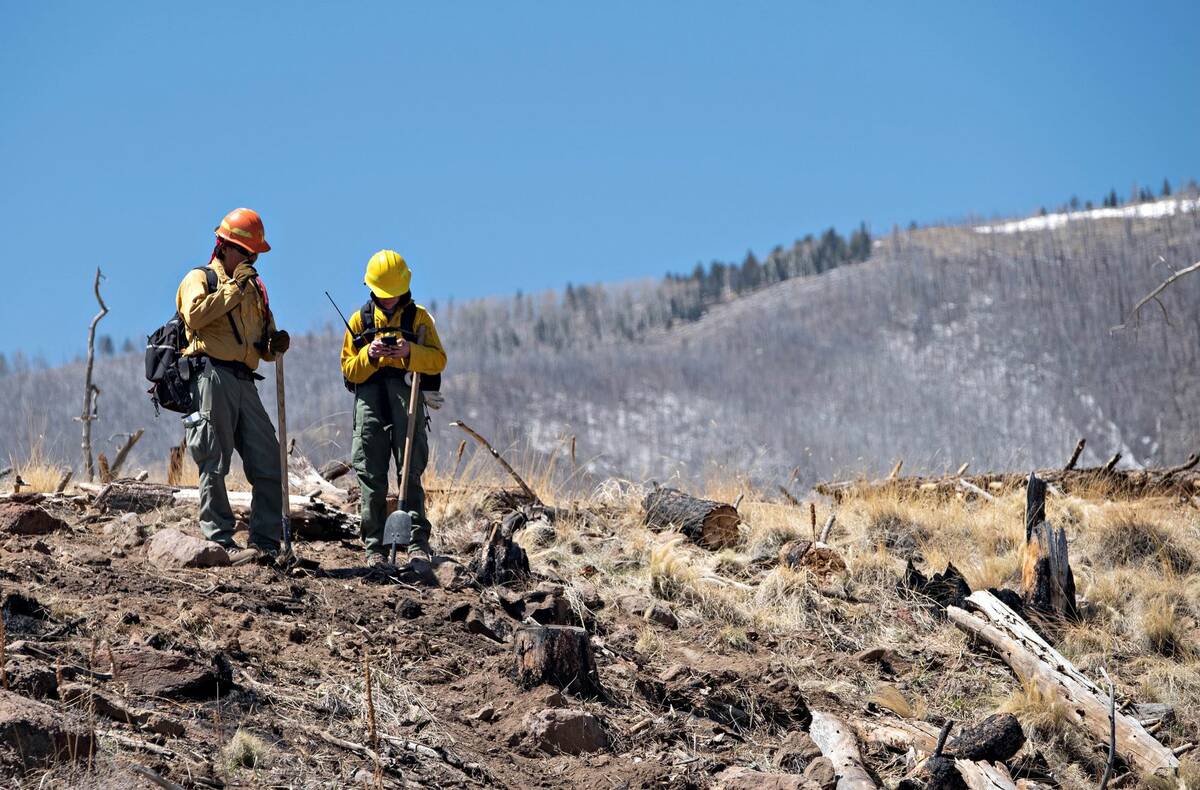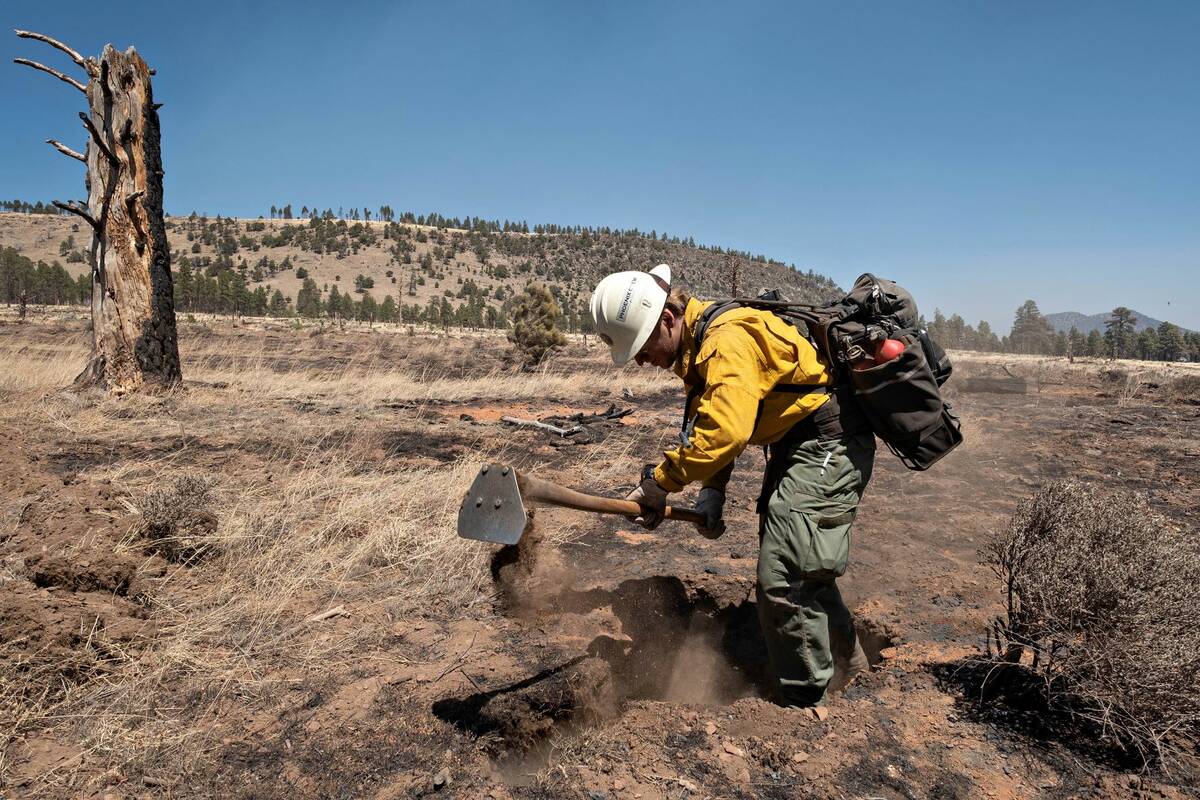Fierce winds fuel wildfires in Arizona, West
FLAGSTAFF, Ariz. — Destructive Southwest fires have burned dozens of homes in northern Arizona and put numerous small villages in New Mexico in the path of danger, as wind-fueled flames chewed up wide swaths of tinder dry forest and grassland and towering plumes of smoke filled the sky.
Firefighters working to keep more homes from burning on the edge of a mountain town in northern Arizona were helped by some snow, scattered showers and cooler temperatures early Friday, but the favorable weather did not last and more gusts were expected to batter parts of Arizona and all of New Mexico through the weekend.
Firefighters were assigned to more than a dozen large fires across the U.S., according to the National Interagency Fire Center. Six blazes were in New Mexico and three were in Arizona, but that didn’t include the many new starts that were reported Friday as conditions deteriorated.
The wind howled across New Mexico on Friday, shrouding the Rio Grande Valley with dust and pushing flames through the Sangre de Cristo Mountains in the north. Fire officials expected one blaze northeast of Santa Fe to overrun several communities before Saturday.
“With the dry conditions, high temperatures, extreme winds and limited suppression ability, the fire is traveling very quickly and it is imperative that residents comply with evacuation orders,” authorities said Friday afternoon.
Neighbors spent the night helping one another pack belongings and load horses and other animals into trailers to escape approaching flames. The rural area is home to several hundred people, but many residences are unoccupied as families have yet to arrive for summer.
Lena Atencio and her husband, whose family has lived in the Rociada area for five generations, got out Friday as winds kicked up. She said people were taking the threat seriously.
“As a community, as a whole, everybody is just pulling together to support each other and just take care of the things we need to now. And then at that point, it’s in God’s hands,” she said as the wind howled miles away in the community of Las Vegas, where evacuees were gathering. “We just have to wait and see what happens.”
Fire managers’ predictions were coming true: With no air support or crews working directly on the fire lines, there was explosive growth. Gusts reached 55-65 mph.
San Miguel County Sheriff Chris Lopez called the situation very dangerous. Evacuation centers were set up and several roads closed.
New Mexico
Another wind-whipped fire in the northeastern corner of New Mexico also was forcing evacuations while the town of Cimarron and the headquarters of the Philmont Scout Ranch, owned and operated by the Boy Scouts of America, were preparing to flee if necessary. The scout ranch attracts thousands of summer visitors, but officials said no scouts were on the property.
New Mexico Gov. Michelle Lujan Grisham signed emergency declarations for four counties over the fires.
More homes destroyed
In Arizona, flames had raced through rural neighborhoods outside Flagstaff just days earlier. A break in the weather Thursday allowed helicopters to drop water on the blaze and authorities to survey the damage.
They found 30 homes and numerous other buildings were destroyed, with sheriff’s officials saying over 100 properties were affected.
That fire has burned close to 32 square miles and forced evacuations of 765 homes after starting last Sunday.
Spot fires threatened to run up mountainous areas overlooking neighborhoods. If that happens, any rainfall in the area could magnify flooding.
Lighter winds are expected over the weekend but fire officials worried winds could shift and push the blaze back onto neighborhoods.
“The lines have been staying really well with the way the winds are going,” said Monica Whicker, who evacuated her home Tuesday. “We have a lot of friends on the other side of the line that are on ‘set,’ so we worry about them, too.”
Authorities used alarms overnight Thursday to warn residents to flee evacuation areas, said sheriff’s spokesman Jon Paxton. Howling winds muffled the alarms.
Kelly Morgan is among neighbors at the edge of the evacuation zone who did not leave. She and her husband have lived through wildfires before, she said, and they’re prepared if winds shift and flames race toward the home they moved into three years ago.
“Unfortunately, it’s not something new to us … but I hate seeing it when people are affected the way they are right now,” she said. “It’s sad. It’s a very sad time, but as a community, we’ve really come together.”
Battling drought
Wildfire has become a year-round threat in the West given changing conditions that include earlier snowmelt and rain coming later in the fall, scientist have said. The problems have been exacerbated by decades of fire suppression and poor management along with a more than 20-year megadrought that studies link to human-caused climate change.
Last winter, Colorado’s most destructive wildfire tore through two densely populated Denver suburbs, and this year’s outlook is not good. Warmer weather and little rain are expected to put the eastern half of the state at “above average significant fire potential” before higher risk spreads statewide in June, fire officials said in their annual wildfire plan released Friday.
Fire danger in the Denver area on Friday was the highest it had been in over a decade, according to the National Weather Service, because of unseasonable temperatures in the 80s combined with strong winds and very dry conditions. It warned people to have a bag ready in case they needed to evacuate.
Firefighters earlier this week stopped blazes before they grew very large although one destroyed or damaged an estimated 15 buildings in the rural community of Monte Vista.
In Arizona, popular lakes and national monuments have closed — some because the wildfire moved directly over them. Wupatki National Monument is in the fire’s path.
Forest officials also have closed areas near blazes in both New Mexico and Arizona, and some local, state and federal land managers have imposed either burn bans or fire restrictions aimed at preventing more fires.



















